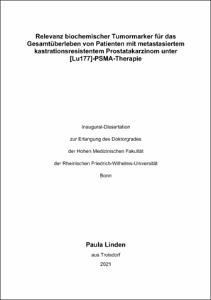Relevanz biochemischer Tumormarker für das Gesamtüberleben von Patienten mit metastasiertem kastrationsresistentem Prostatakarzinom unter [Lu177]-PSMA-Therapie

Relevanz biochemischer Tumormarker für das Gesamtüberleben von Patienten mit metastasiertem kastrationsresistentem Prostatakarzinom unter [Lu177]-PSMA-Therapie

| dc.contributor.advisor | Ahmadzadehfar, Hojjat | |
| dc.contributor.author | Linden, Paula | |
| dc.date.accessioned | 2021-10-15T12:47:08Z | |
| dc.date.available | 2021-10-15T12:47:08Z | |
| dc.date.issued | 15.10.2021 | |
| dc.identifier.uri | https://hdl.handle.net/20.500.11811/9363 | |
| dc.description.abstract | Hintergrund: Die PSMA-Radiologandentherapie gilt zurzeit noch als letzte Behandlungsoption bei Patienten mit metastasiertem kastrationsresistentem Prostatakarzinom. Die Prognose der Patienten ist meist schlecht, weshalb eine genaue Kenntnis des Gesamtüberlebens dieser Patienten unter PSMA-RLT essentiell für die Einschätzung der Effektivität der PSMA-Radioligandentherapie ist. Ziel dieser Studie ist herauszufinden, inwieweit bestimmte Tumormarker und deren Veränderungen mit dem Gesamtüberleben der Patienten korrelieren. Methoden: Die erhobenen Tumormarker ALP, BAP, PSA, LDH, CgA und pro-GRP stehen alle im Zusammenhang mit Prostatakrebs und wurden vor jedem PSMA-RLT-Zyklus und während der Nachuntersuchung beobachtet. Alle 137 Patienten wurden bis zu ihrem Tod untersucht. Die Korrelation zwischen den einzelnen Tumormarkern und dem Gesamtüberleben wurde mit Hilfe des Log-Rank-Tests, multivariable Analysen wurden mittels Cox-Regression ermittelt. Das Signifikanzniveau wurde auf p < .05 gesetzt. Ergebnisse: 137 Patienten wurden im Zeitraum von Januar 2015 - November 2017 mit insgesamt 487 PSMA-RLT-Zyklen behandelt. Von den Ausgangswerten korrelierten ALP, LDH und PSA signifikant mit einem verlängerten Gesamtüberleben (p < .001 für ALP und LDH, p = .007 für PSA). Stabile und/oder erniedrigte Werte für AP, LDH, PSA, pro-GRP und BAP korrelierten signifikant mit einem längeren Gesamtüberleben. Patienten mit permanent steigenden Werten hatten das kürzeste Gesamtüberleben. | en |
| dc.description.abstract | The value of tumor markers in men with metastatic prostate cancer undergoing [177Lu]Lu-PSMA therapy
Background: Currently, prostate-specific membrane antigen-radioligand therapy (PSMA-RLT) is considered a last-line treatment option in advanced castration-resistant prostate cancer. Despite these patients' poor prognosis, accurate estimation of their overall survival (OS) is essential to determine whether benefits exist from the treatment and whether the loss of valuable time and unnecessary side effects can be avoided. The aim of the present study is to evaluate whether various biochemical markers can predict OS in men undergoing PSMA-RLT and whether the changes assessed after PSMA-RLT correlate with the OS. Methods: The tested tumor markers in this retrospective analysis were alkaline phosphatase (ALP), bone-specific alkaline phosphatase (BAP), prostate-specific antigen (PSA), lactate dehydrogenase (LDH), chromogranin A, and pro-gastrin-releasing peptide (pro-GRP). For the evaluation, we performed blood tests before each PSMA-RLT cycle and during follow-up visits (which were 2-3 months apart). All patients were followed up until their deaths. To test the correlations between the tumor markers and survival, we conducted the logrank tests and the multivariate Cox proportional-hazards regression model. The significance level was set at P < .05. Results: The study included 137 patients who received a total of 487 PSMA-RLT cycles between January 2015 and November 2017. Of the tested biochemical tumor markers, baseline ALP (120 U/L cut-off), LDH (248 U/L cut-off), and PSA (first quartile cut-off) correlated significantly with survival post-PSMA-RLT (P < .001 for ALP and LDH, and P = .007 for PSA). Stable and/or decreased values in most of the initially abnormal parameters were associated with significantly better OS; these parameters were ALP (P = .009), LDH (P = .005), PSA (P < .001), and pro-GRP (P = .013). The BAP and ALP responses also correlated significantly with survival in patients with bone metastases (P = .002 and P < .001, respectively). Furthermore, there was a strong correlation of the kinetic patterns of PSA, ALP, BAP, and LDH with the survival, showing that patients with steadily increasing markers had the shortest OS. Conclusion: Along with the established tumor marker PSA, ALP, LDH, BAP, and pro-GRP were correlated with the OS post-PSMA-RLT in the univariate and multivariate analyses. | en |
| dc.language.iso | deu | |
| dc.rights | In Copyright | |
| dc.rights.uri | http://rightsstatements.org/vocab/InC/1.0/ | |
| dc.subject | Prostatakarzinom | |
| dc.subject | Radioligandentherapie | |
| dc.subject | metastasiertes kastrationsresistenzes Prostatakarzinom | |
| dc.subject | PSMA | |
| dc.subject | Tumormarker | |
| dc.subject | Lutetium 177 | |
| dc.subject | Prostate cancer | |
| dc.subject | Lu-PSMA-therapy | |
| dc.subject | tumormarkers | |
| dc.subject | metastatic prostate cancer | |
| dc.subject | radiologand | |
| dc.subject.ddc | 610 Medizin, Gesundheit | |
| dc.title | Relevanz biochemischer Tumormarker für das Gesamtüberleben von Patienten mit metastasiertem kastrationsresistentem Prostatakarzinom unter [Lu177]-PSMA-Therapie | |
| dc.type | Dissertation oder Habilitation | |
| dc.publisher.name | Universitäts- und Landesbibliothek Bonn | |
| dc.publisher.location | Bonn | |
| dc.rights.accessRights | openAccess | |
| dc.identifier.urn | https://nbn-resolving.org/urn:nbn:de:hbz:5-64148 | |
| dc.relation.doi | https://doi.org/10.1002/pros.23912 | |
| ulbbn.pubtype | Erstveröffentlichung | |
| ulbbnediss.affiliation.name | Rheinische Friedrich-Wilhelms-Universität Bonn | |
| ulbbnediss.affiliation.location | Bonn | |
| ulbbnediss.thesis.level | Dissertation | |
| ulbbnediss.dissID | 6414 | |
| ulbbnediss.date.accepted | 28.09.2021 | |
| ulbbnediss.institute | Medizinische Fakultät / Kliniken : Klinik und Poliklinik für Nuklearmedizin | |
| ulbbnediss.fakultaet | Medizinische Fakultät | |
| dc.contributor.coReferee | Schmidt-Wolf, Ingo G. H. | |
| ulbbnediss.contributor.gnd | 1248861507 |
Dateien zu dieser Ressource
Das Dokument erscheint in:
-
E-Dissertationen (2062)




